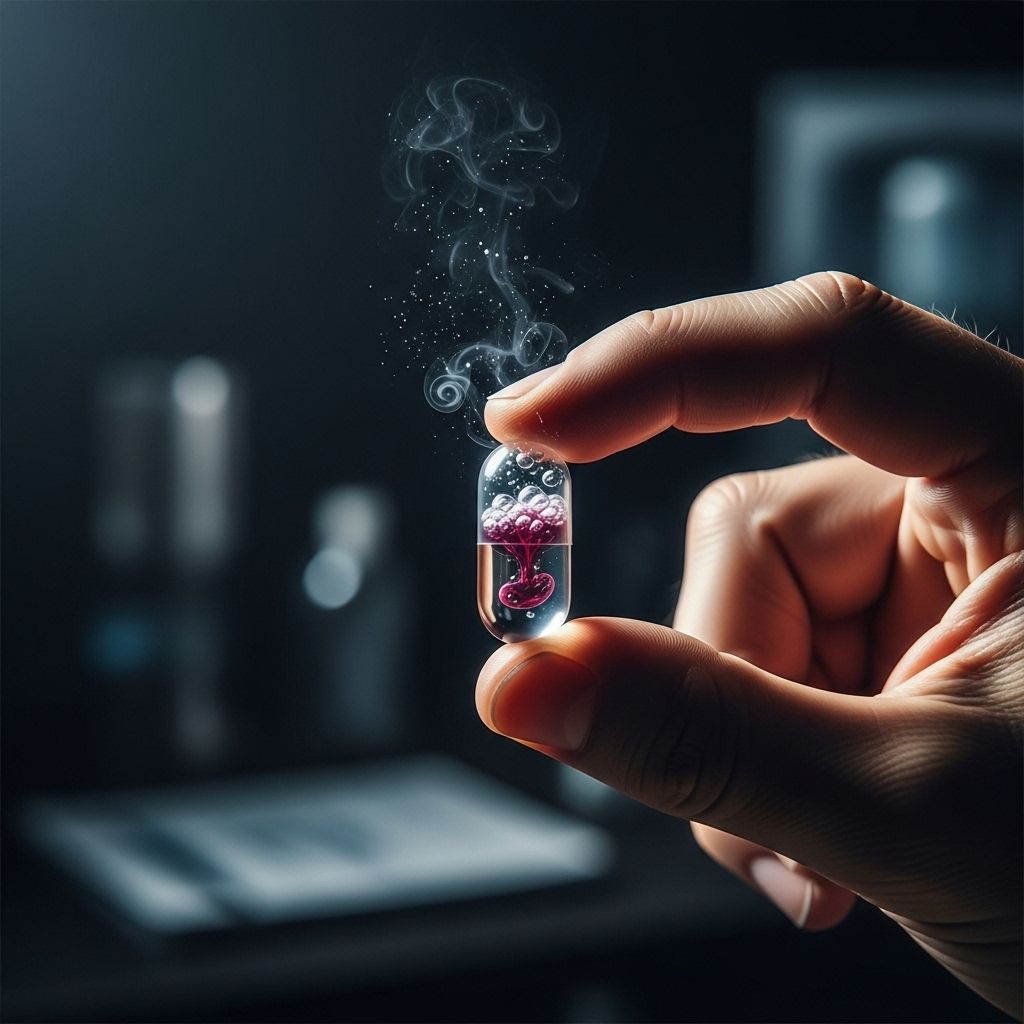Nitric Oxide Supplements: Side Effects, Risks & Precautions
Dive deep into nitric oxide supplements—unveiling dangers, interactions, and essential safety advice for informed use.

Nitric oxide (NO) supplements have surged in popularity due to claims of enhanced athletic performance, better blood flow, and improved cardiovascular health. However, as with any supplement, there are significant concerns associated with misuse or unmonitored intake. This comprehensive guide examines the documented side effects, risk factors, and the populations who should exercise special caution with nitric oxide supplementation.
What Are Nitric Oxide Supplements?
Nitric oxide is a molecule naturally produced by the body, essential for relaxing inner muscles of blood vessels, thus increasing circulation. However, in supplement form, it is not actual nitric oxide but typically includes precursors like l-arginine or l-citrulline which facilitate NO production. Marketed predominantly as performance enhancers, these supplements are widely used in fitness communities.
General Side Effects of Nitric Oxide Supplements
Most healthy individuals tolerate nitric oxide boosters well. However, some users may experience undesirable side effects, especially at higher doses or with prolonged use. Commonly reported side effects include:
- Gastrointestinal issues (nausea, vomiting, diarrhea)
- Headaches
- Dizziness and lightheadedness
- Rapid heartbeat (palpitations)
For healthy adults, these effects are generally mild and transient, but they can be serious for those with certain underlying conditions.
Serious and Rare Side Effects
- Massive vasodilation, leading to dangerously low blood pressure. This can cause fainting, shock, or even a stroke in susceptible individuals.
- Allergic reactions: These may present as swelling, itching, hives, or severe breathing difficulties.
- Breathing difficulties: Some may experience shortness of breath or tightness in the chest, requiring immediate medical attention.
- Neurological symptoms: Dizziness, confusion, and in rare cases, even loss of consciousness.
Note: The severity and likelihood of these effects often depend on dosage, individual health status, and concurrent medical conditions.
Who Is at Increased Risk?
While most healthy individuals withstand moderate supplementation, some groups are particularly vulnerable to the side effects of nitric oxide:
- People with low blood pressure: NO can further reduce blood pressure, elevating risk of fainting or collapse.
- Heart conditions: Those with heart disease, recent heart attacks, or arrhythmias face higher risk of complications.
- Liver disease (e.g., cirrhosis): The body’s ability to metabolize these supplements may be impaired.
- Kidney disease: Poor filtration can increase the accumulation of precursor compounds, enhancing toxicity.
- History of herpes infection: Arginine can potentially trigger herpes virus replication.
- Guanidinoacetate methyltransferase deficiency: This rare metabolic disorder can be worsened by certain NO precursors.
If you fall under any of these categories, consult a healthcare professional before using nitric oxide supplements.
Populations Who Should Avoid Nitric Oxide Supplements
| Condition | Why Risk Increases |
|---|---|
| Recent heart attack | Increased risk of repeated cardiac events and abnormal blood pressure fluctuations |
| Chronic kidney disease | Impaired excretion, risk of toxicity, worsened renal damage |
| Liver cirrhosis | Inefficient metabolism, possible toxic compound buildup |
| Low blood pressure (hypotension) | Potential for dangerous blood pressure drops |
| Herpes simplex infection | Arginine may stimulate viral replication, increasing outbreak frequency/severity |
| Children / Adolescents | Lack of safety data and higher sensitivity to vascular changes |
Each condition heightens the potential adverse effect profile of nitric oxide supplementation. Extra caution or outright avoidance is advised in these scenarios.
Drug Interactions with Nitric Oxide Supplements
Nitric oxide supplements can interact with a wide array of prescription and OTC drugs, sometimes dangerously:
- Antihypertensives (blood pressure medications): NO may enhance the pressure-lowering effect, leading to hypotension.
- Diabetes medications: There is potential for changes in blood sugar levels or inappropriate vascular responses.
- Erectile dysfunction medications (e.g., sildenafil): These already increase nitric oxide; combination increases risk of severe blood pressure drops.
- Antiplatelet and anticoagulant drugs: NO’s vascular effects may theoretically enhance bleeding risk, though data is limited.
If you take any prescription drugs, always review supplement use with a doctor or pharmacist first.
Long-Term Safety and Chronic Use Concerns
Currently, there is insufficient research on the long-term safety of self-administered nitric oxide supplements. Key potential risks include:
- Habituation: The body may become reliant on the supplement for optimal nitric oxide production.
- Nutrient deficiencies: Some forms, particularly inhaled nitrous oxide before procedures, are associated with vitamin B12 deficiency over time.
- Unknown metabolic effects: Chronic elevation of nitric oxide may have unforeseen impacts on immunity and vascular health.
Special Consideration: Inhaled Nitrous Oxide
It is important to distinguish oral nitric oxide precursors from inhaled nitrous oxide (often called “laughing gas”). Used in medical and dental settings, inhaled nitrous oxide can produce unique risks, especially with repeated or recreational use.
- Short-term effects: Dizziness, euphoria, headache, nausea, temporary numbness or tingling.
- Repeated use: Risk of vitamin B12 deficiency, nerve damage, and in severe cases, neurological impairment.
- Improper use (recreational or deliberate misuse):
- Abnormal blood counts
- Neurological problems (limb weakness, tingling, trouble walking, even paralysis)
- Loss of consciousness, psychiatric disturbances (delusions, hallucinations, paranoia, depression)
- Death from suffocation or asphyxiation
FDA Guidance: Never inhale commercial nitrous oxide dispensers for recreational purposes, as the risks can be fatal.
Who Might Benefit and Who Should Avoid?
Some evidence suggests potential benefits under expert supervision for certain populations (e.g., controlled heart disease, specific circulatory problems). However, self-medication is not recommended due to risk factors and insufficient scientific evidence for many of the claimed benefits.
| Population | Should Use? | Notes |
|---|---|---|
| Healthy adults (short-term use) | With caution, after consulting a doctor | Monitor for symptoms and interactions |
| Elderly & children | No (unless prescribed) | More vulnerable to side effects |
| People with chronic conditions | No (unless under medical supervision) | Documented increased risks |
Identifying Symptoms of Adverse Events
- Gastrointestinal pain, vomiting, diarrhea
- Sudden drop in blood pressure (dizziness, fainting)
- Severe or persistent headache
- Palpitations or chest pain
- Breathing difficulties, swelling, itching (allergic signs)
- Neurological symptoms: confusion, numbness, loss of coordination
If any of these symptoms appear after taking a nitric oxide supplement, seek prompt medical attention.
Precautionary Measures Before Using Nitric Oxide Supplements
- Consult your healthcare provider, especially if you have a pre-existing medical condition or are on any medication.
- Always follow labeled dosage instructions and never exceed recommended intake.
- Avoid combining nitric oxide boosters with other drugs or supplements that affect blood pressure or vascular function unless under medical supervision.
- Store supplements responsibly out of reach of children.
- Monitor for any new or worsening symptoms when starting supplementation.
Natural Alternatives to Nitric Oxide Supplements
Rather than relying solely on supplements, individuals can increase natural nitric oxide levels through:
- Consuming dietary nitrates from leafy greens, beets, and certain fruits
- Engaging in regular cardiovascular exercise
- Avoiding excessive saturated fats which impair vascular health
- Reducing smoking and alcohol intake, which negatively impact NO production
Frequently Asked Questions (FAQs)
Are nitric oxide supplements safe for long-term use?
There is insufficient research confirming the safety of long-term, unsupervised NO supplement use. Chronic intake can increase side effect risk and may lead to dependency or nutrient imbalances.
Can nitric oxide supplements help with erectile dysfunction?
Some supplements may improve blood flow, but prescription medications are usually more effective and thoroughly researched. Consult your doctor before trying supplements for this purpose.
Is it safe to mix nitric oxide boosters with pre-workout supplements?
This is not recommended, as individual pre-workout formulas may already include NO precursors. Combining them increases risk of overdose, excessive vasodilation, and side effects.
How quickly do side effects appear after taking nitric oxide?
Most side effects will manifest within a few hours, though some can be delayed (such as B12 deficiency with chronic inhaled nitrous oxide use). Contact a healthcare provider promptly if you notice unusual symptoms.
What should I do if I experience severe dizziness or fainting after using nitric oxide?
Discontinue use immediately and seek medical attention. These symptoms might indicate an unsafe drop in blood pressure or an adverse drug interaction.
Key Takeaways
- Consult your doctor before using NO supplements, especially if you have existing health conditions.
- Be vigilant regarding possible side effects, especially gastrointestinal symptoms, headaches, and blood pressure changes.
- Never use nitrous oxide inhalers or canisters recreationally.
- Monitor for symptoms of allergy or neurological effects, and seek help if they occur.
- Consider natural lifestyle modifications for cardiovascular support rather than relying solely on supplementation.
Read full bio of Sneha Tete











